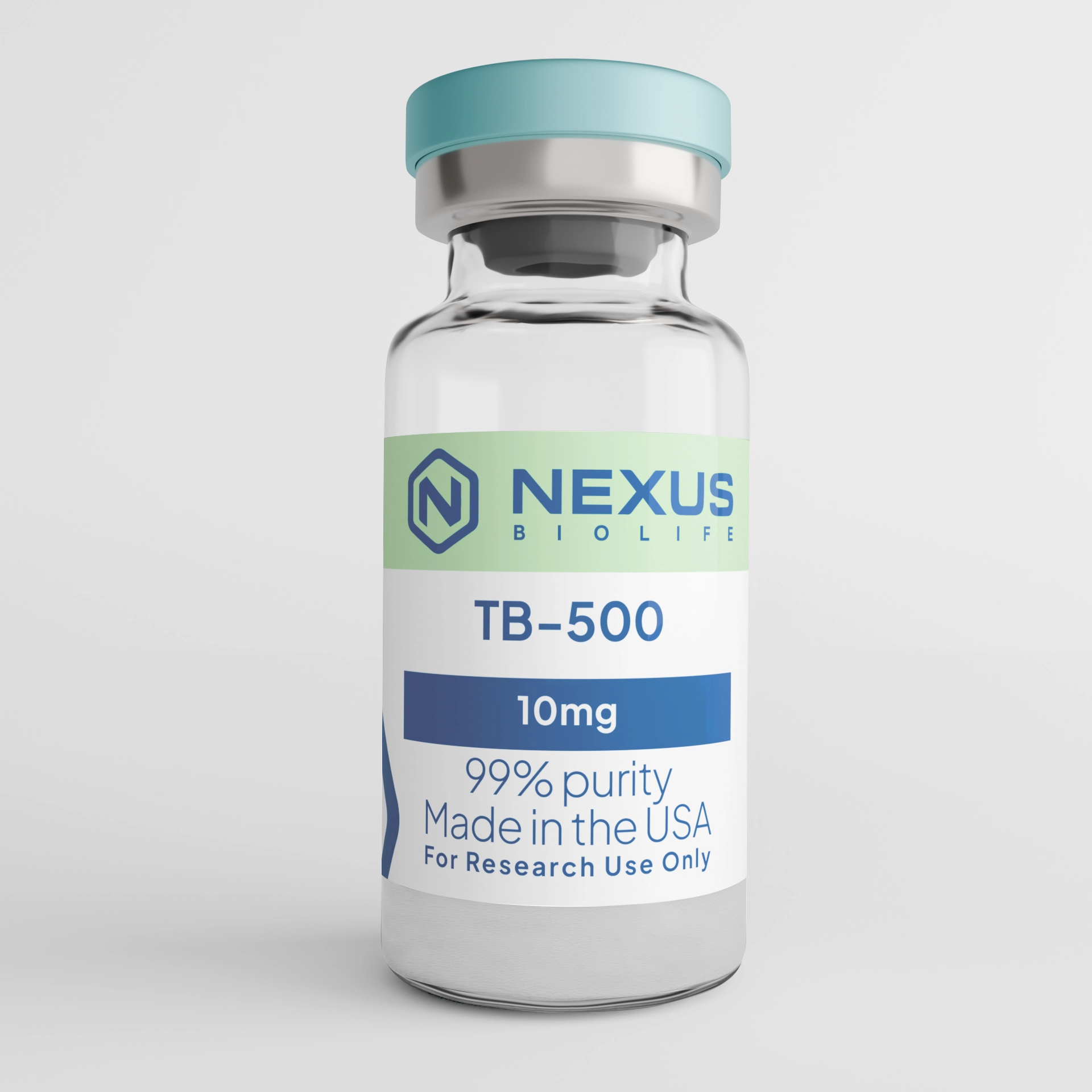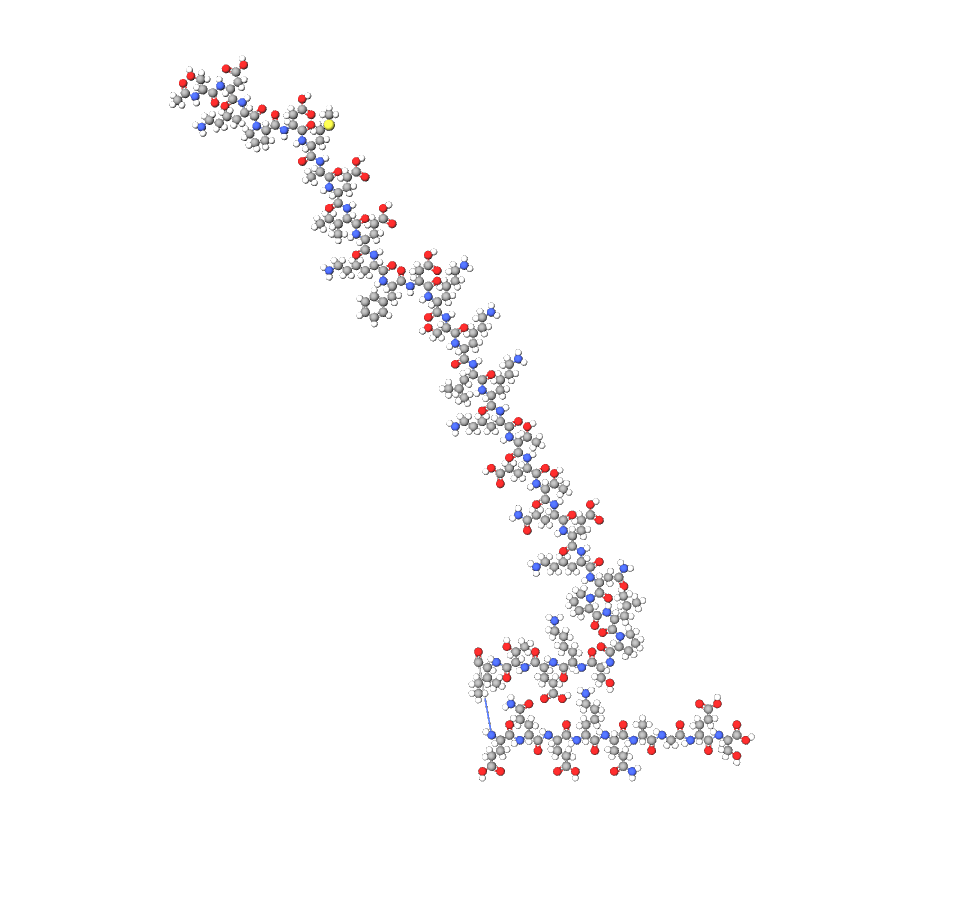
Thymosin Beta-4, or TB-500 Long Chain, is a synthetic peptide meticulously prepared for scientific inquiry. This product is synthesized with high purity for laboratory investigations. It is developed for use in various research applications. Thymosin Beta-4 is designated solely for research and development purposes.

From a structural standpoint, Thymosin Beta-4 features the amino acid sequence Ac-Ser-Asp-Lys-Pro-Asp-Met-Ala-Glu-Ile-Glu-Lys-Phe-Asp-Lys-Ser-Lys-Leu-Lys-Lys-Thr-Glu-Thr-Gln-Glu-Lys-Asn-Pro-Leu-Pro-Ser-Lys-Glu-Thr-Ile-Glu-Gln-Glu-Lys-Gln-Ala-Gly-Glu-Ser-OH, with an N-terminal acetyl group for stability and no disulfide bonds, contributing to its flexible conformation. Its molecular formula is C212H350N56O78S, with a molecular weight of approximately 4964 Da and an isoelectric point around 5.1. This peptide is water-soluble, exhibits high stability in lyophilized form at low temperatures, and binds G-actin in a 1:1 complex to prevent polymerization, facilitating cell migration in assays. In lab contexts, it's often reconstituted in sterile buffers for in-vitro studies on cell lines like fibroblasts or keratinocytes. We handle these specifics with a calm rationale: grasping the structure aids in refining protocols, but keep in mind, our peptides are exclusively for research—not for any diagnostic or therapeutic purposes.
At our company, we're all about making peptide science approachable and reliable for researchers like you. Thymosin Beta-4, often abbreviated as **TB4**, is a naturally occurring 43-amino acid peptide that acts as a key regulator in cellular processes, primarily known for its role in sequestering G-actin to influence cell motility and structure. This small, ubiquitous peptide is found in high concentrations across various mammalian tissues and is frequently studied for its involvement in tissue repair and regeneration models. In research settings, TB4 is valued for its potential to promote wound healing and anti-inflammatory responses in in-vitro assays, always with the clear emphasis on laboratory use only—no suggestions for human consumption or clinical applications. Picture it as a versatile tool for exploring cellular dynamics, straightforward and effective in controlled experimental environments.
Delving into its origins, Thymosin Beta-4 was first isolated in the 1970s from calf thymus tissue during efforts to purify thymic hormones, initially believed to be a thymus-specific factor but later recognized as widely distributed in cells. Early purification work from bovine thymus led to its sequencing in the early 1980s, revealing its conserved structure across species and shifting focus to its actin-binding properties. Subsequent studies in cell cultures and animal models, such as mice and rats, highlighted its regenerative capabilities, laying the groundwork for ongoing investigations into tissue repair mechanisms. We're passionate about these historical insights because they highlight the power of methodical science—patient discovery that equips researchers with dependable tools for hypothesis testing, free from hype or overstatements.
In wrapping up, Thymosin Beta-4 stands as a prime example of nature's efficient design—a compact peptide with broad potential in regenerative and cellular research. As your steady partner in peptide exploration, we're excited to provide such resources to fuel your discoveries, always grounded in transparency and a friendly eagerness to share knowledge. Whether investigating actin sequestration or tissue healing dynamics, TB4 offers a reliable base for advancement. Let's keep pushing the boundaries of science together, step by thoughtful step.
Researchers commonly employ Thymosin Beta-4 in fields like regenerative biology, where it's examined in cellular models to assess actin dynamics and migration in fibroblasts or endothelial cells, or in animal systems for dermal repair in wound models. It's also utilized in neurobiology studies, such as oligodendrocyte differentiation assays or brain organoid models for conditions like Alzheimer's, and in inflammatory response investigations using monocyte cultures. We ensure our TB4 undergoes rigorous HPLC and mass spectrometry verification for purity, building confidence in your experimental outcomes.
Practically speaking: Store the lyophilized powder at -20°C, and reconstitute with sterile water or appropriate buffers for in-vitro work. Common research dosages include micromolar concentrations in cell cultures or up to 10 mg/kg in rodent models, but always adjust based on your study's needs. Crucially, this peptide is intended solely for laboratory research—not for human use, diagnostics, or treatments. We're here to support your explorations with quality and a collaborative mindset.
Scientifically, Thymosin Beta-4 has been linked to multifaceted regenerative effects in experimental setups, such as accelerating wound closure in dermal models by promoting keratinocyte migration and reducing inflammation via monocyte signaling. In rodent studies, it has shown potential to enhance hair follicle activation, support cardiac cell survival post-injury, and alleviate glomerular damage in kidney models without disrupting normal physiology. Distinct from other actin regulators, it maintains cellular integrity during stress, fostering proteoglycan synthesis in chondrocytes for joint repair simulations and even boosting NK cell activity in immune assays. Our view? These properties position TB4 as an insightful probe for unraveling repair and anti-inflammatory pathways, all anchored in evidence-driven, precise research.
At our company, we're all about making peptide science approachable and reliable for researchers like you. Thymosin Beta-4, often abbreviated as **TB4**, is a naturally occurring 43-amino acid peptide that acts as a key regulator in cellular processes, primarily known for its role in sequestering G-actin to influence cell motility and structure. This small, ubiquitous peptide is found in high concentrations across various mammalian tissues and is frequently studied for its involvement in tissue repair and regeneration models. In research settings, TB4 is valued for its potential to promote wound healing and anti-inflammatory responses in in-vitro assays, always with the clear emphasis on laboratory use only—no suggestions for human consumption or clinical applications. Picture it as a versatile tool for exploring cellular dynamics, straightforward and effective in controlled experimental environments.
Delving into its origins, Thymosin Beta-4 was first isolated in the 1970s from calf thymus tissue during efforts to purify thymic hormones, initially believed to be a thymus-specific factor but later recognized as widely distributed in cells. Early purification work from bovine thymus led to its sequencing in the early 1980s, revealing its conserved structure across species and shifting focus to its actin-binding properties. Subsequent studies in cell cultures and animal models, such as mice and rats, highlighted its regenerative capabilities, laying the groundwork for ongoing investigations into tissue repair mechanisms. We're passionate about these historical insights because they highlight the power of methodical science—patient discovery that equips researchers with dependable tools for hypothesis testing, free from hype or overstatements.
In wrapping up, Thymosin Beta-4 stands as a prime example of nature's efficient design—a compact peptide with broad potential in regenerative and cellular research. As your steady partner in peptide exploration, we're excited to provide such resources to fuel your discoveries, always grounded in transparency and a friendly eagerness to share knowledge. Whether investigating actin sequestration or tissue healing dynamics, TB4 offers a reliable base for advancement. Let's keep pushing the boundaries of science together, step by thoughtful step.
From a structural standpoint, Thymosin Beta-4 features the amino acid sequence Ac-Ser-Asp-Lys-Pro-Asp-Met-Ala-Glu-Ile-Glu-Lys-Phe-Asp-Lys-Ser-Lys-Leu-Lys-Lys-Thr-Glu-Thr-Gln-Glu-Lys-Asn-Pro-Leu-Pro-Ser-Lys-Glu-Thr-Ile-Glu-Gln-Glu-Lys-Gln-Ala-Gly-Glu-Ser-OH, with an N-terminal acetyl group for stability and no disulfide bonds, contributing to its flexible conformation. Its molecular formula is C212H350N56O78S, with a molecular weight of approximately 4964 Da and an isoelectric point around 5.1. This peptide is water-soluble, exhibits high stability in lyophilized form at low temperatures, and binds G-actin in a 1:1 complex to prevent polymerization, facilitating cell migration in assays. In lab contexts, it's often reconstituted in sterile buffers for in-vitro studies on cell lines like fibroblasts or keratinocytes. We handle these specifics with a calm rationale: grasping the structure aids in refining protocols, but keep in mind, our peptides are exclusively for research—not for any diagnostic or therapeutic purposes.

Researchers commonly employ Thymosin Beta-4 in fields like regenerative biology, where it's examined in cellular models to assess actin dynamics and migration in fibroblasts or endothelial cells, or in animal systems for dermal repair in wound models. It's also utilized in neurobiology studies, such as oligodendrocyte differentiation assays or brain organoid models for conditions like Alzheimer's, and in inflammatory response investigations using monocyte cultures. We ensure our TB4 undergoes rigorous HPLC and mass spectrometry verification for purity, building confidence in your experimental outcomes.
Practically speaking: Store the lyophilized powder at -20°C, and reconstitute with sterile water or appropriate buffers for in-vitro work. Common research dosages include micromolar concentrations in cell cultures or up to 10 mg/kg in rodent models, but always adjust based on your study's needs. Crucially, this peptide is intended solely for laboratory research—not for human use, diagnostics, or treatments. We're here to support your explorations with quality and a collaborative mindset.
Scientifically, Thymosin Beta-4 has been linked to multifaceted regenerative effects in experimental setups, such as accelerating wound closure in dermal models by promoting keratinocyte migration and reducing inflammation via monocyte signaling. In rodent studies, it has shown potential to enhance hair follicle activation, support cardiac cell survival post-injury, and alleviate glomerular damage in kidney models without disrupting normal physiology. Distinct from other actin regulators, it maintains cellular integrity during stress, fostering proteoglycan synthesis in chondrocytes for joint repair simulations and even boosting NK cell activity in immune assays. Our view? These properties position TB4 as an insightful probe for unraveling repair and anti-inflammatory pathways, all anchored in evidence-driven, precise research.
